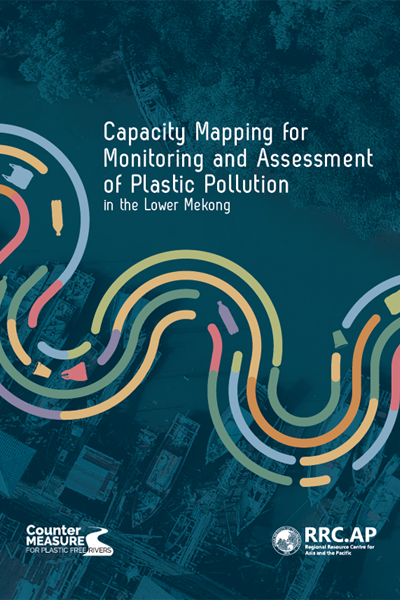REPORTS & PUBLICATION
REPORTS

Asia Waste Management Outlook (AWMO)
2017 | RRC.AP
The Asia Waste Management Outlook (AWMO) provides an overview of the challenges and opportunities in waste management in the context of Asia. The AWMO is not intended to be a directory of wasterelated data or statistics; rather, it is intended to provide a perspective with prescriptions for a variety of stakeholders to encourage early action. It is also intended to provide an overview of the current status, current cutting-edge thinking, and the future of solid waste management in Asia over the medium term.

Capacity Mapping for Monitoring and Assessment of Plastic Pollution in the Lower Mekong
2020 | RRC.AP
This report presents findings of capacity-mapping study on the monitoring and assessment of plastic pollution in the Lower Mekong Region. The study was conducted as part of the UN Environment Regional Office for Asia and the Pacific's project titled the *Promotion of ConterMEASUREs against Marine Plastic Litter in Southeast Asia and India" (hereafter, referred to as * ConterMEASURE project"). The CounterMEASURE project aims to develop a region-based approach for the monitoring and assessment of land-based plastic waste leakage and for pollution reduction into inland water ways, such as rivers, canals and drainage systems, and the eventual transport of plastic waste into the oceans.

Ulaanbaatar Waste Management Improvement Strategy and Action Plan 2017-2030
2017 | RRC.AP
The UWMISAP is divided into five chapters. The first chapter provides a background for the need for a city waste management strategy for Ulaanbaatar and outlines the process of developing a strategy and action plan. The existing situation of Ulaanbaatar’s solid waste generation as well as waste handling and legal framework are discussed in Chapter 2. Based on the baseline information provided in Chapter 2, a list of strategies to fill existing gaps and tap potential opportunities is described in Chapter 3. Chapter 4 presents specific actions to be accomplished under each strategic objective. Chapter 5 concludes with arrangements for implementing and monitoring the UWMISAP.

Mongolia National Waste Management Improvement Strategy and Action Plan 2017-2030
2017 | AIT RRC.AP
The NWMISAP is arranged into five chapters. The first chapter provides the background for the need of a waste management strategy, the existing situation of waste management in Mongolia and the current policy and legal framework. Chapter Two describes the strategy development process. Based on this baseline information, a list of strategies to fill the existing gaps and tap the potential opportunities are laid out in the third chapter. Translating these strategic objectives into actions is presented in Chapter Four. The fifth chapter concludes with arrangements for implementation and monitoring of the NWMISAP.
Sanitation Finance in Rural Cambodia
2012 | The world bank, Water and Sanitation Program
This document presents the findings of a study on sanitation finance in Cambodia conducted for the Water and Sanitation Program (WSP) with support from the Asian Development Bank (ADB). The overall objective of the assignment was to consider sustainable sanitation financing options with a focus on promoting access for the poorest.
Asian Sanitation Data Book 2008: Achieving Sanitation for All
2009 | Asian Development Bank
The first data book on sanitation for the Asia and Pacific region, this book features raw data and analyses on the sanitation situation in 27 cities. The initiative was realized in response to the needs of Asian cities and local governments, which gathered at the International Seminar on Sanitation 2007— Delivering Our Vision: Sanitation for All, organized by CITYNET, ADB, and the city government of Makati, at the ADB headquarters in Metro Manila, Philippines, in November 2007. Sanitation has long been an issue that has received little attention due to its complexity. The absence of relevant data has hindered cities and local governments from adopting appropriate policies and strategies to meet the provision of “sanitation for all.†Moreover, technologies that reflect the needs of communities, as well as the communities’ ability and willingness to pay for better sanitation, are limited. This publication, the first joint effort of CITYNET, the Asian Development Bank (ADB), the United Nations Human Settlements Programme (UN-HABITAT), and Veolia Environnement, highlights the need for more work to be done on sanitation in Asia and the Pacific. Focus and action must be directed at accurate data collection and management to support decision making, appropriate and low-cost technologies, and the allocation of resources for the provision of sanitation. These are but a few issues that need immediate attention and action. Contents Summary of Findings Sanitation Comparison City Sanitation Profile Appendix
 The kNOwWaste Knowledge Platform was developed through a Project Cooperation Agreement funding by UNEP on 2016. The platform provides data and information on holistic waste management to stakeholders in Asia and the Pacific region. The platform was developed with the following aims: generate and consolidate data or information on holistic waste management, transform data into easily comprehensible outputs for use by key stakeholders, map out and disseminate information on international waste management projects under the GPWM and UNEP projects as well as other international partners, and provide capacity building support through dissemination of data or information support for relevant stakeholders on holistic waste and waste management system.
The kNOwWaste Knowledge Platform was developed through a Project Cooperation Agreement funding by UNEP on 2016. The platform provides data and information on holistic waste management to stakeholders in Asia and the Pacific region. The platform was developed with the following aims: generate and consolidate data or information on holistic waste management, transform data into easily comprehensible outputs for use by key stakeholders, map out and disseminate information on international waste management projects under the GPWM and UNEP projects as well as other international partners, and provide capacity building support through dissemination of data or information support for relevant stakeholders on holistic waste and waste management system.

 2025 © Regional Resource Center for Asia and the Pacific (RRC.AP). All Rights Reserved.
2025 © Regional Resource Center for Asia and the Pacific (RRC.AP). All Rights Reserved.
